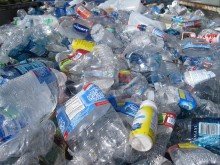Kenya has banned plastic bags. Kenyans could face up to four years in gaol or £31,000 fines for selling or using them. A lot more effective than a 5p charge that may or may not go to charity. UNEP (UN environment programme) estimate this ban will stop 100m plastic bags being given out each year. This will reduce the damage caused to the environment; fewer plastic bags mean fewer birds suffocating, fewer dolphins with stomachs full of plastic starving to death.
The impact of plastic is undeniable; it is threatening our future, it is filling up the planet. 80% of the plastic used between the 1950’s and 2015 is in landfill or in the natural environment and our use of it is increasing. Microplastic contamination is found in tap water (72% of samples in Europe were contaminated), there is plastic in seafood and plastic fibres in the air. There is even a floating plastic island – https://www.ecolife.com/recycling/plastic/pacific-plastic-island-garbage-patch.html
Government action is required to address this, so we need to make some noise about it. Companies need to reduce their use of plastics, so we need to encourage them and the best way to do that is by not buying so much of it.
Don’t get me wrong, my house is no utopia of natural materials with not so much as a plastic bead evident. It is sadly awash with plastic, much unnecessary, there are toys and storage boxes, printers and windows, pens and pots all within my reach as I type. I am trying to reduce the accumulation of it and my use of it in general. Starting with plastic bags, takeaway coffee cups and single use plastic bottles, I think that is manageable, I have jute bags, a reusable biodegradable bamboo cup with lid and a flask.
Try going a day without using anything plastic and see how easy it is. Given how long it takes to breakdown (a bag takes 500 – 1,000 years) our rubbish will outlive us all and, quite possibly, earth itself.
Councillor Simon Bull
Accept the Trash Isles as an official country & help protect our oceans: https://t.co/1XXDSxsRTM







